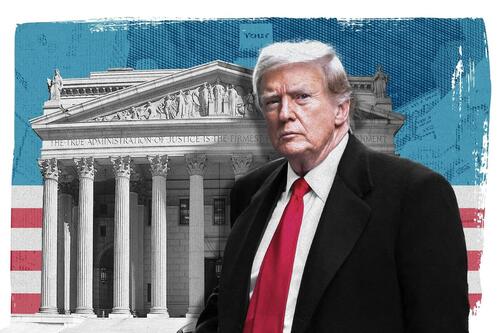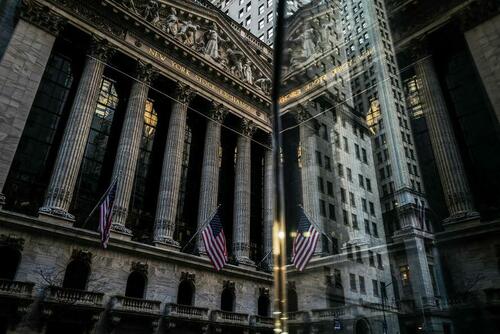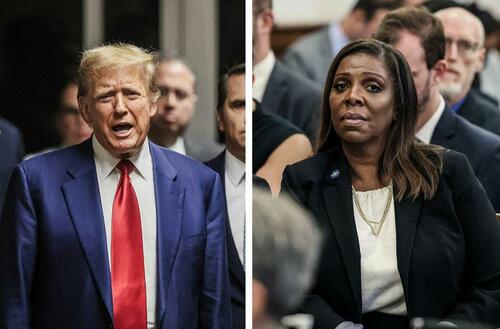New Yorkers Silently Worrying Over Ramifications Of Trump Ruling
Authored by Janice Hisle and Catherine Yang via The Epoch Times (emphasis ours),

Monday’s dramatic bond reduction for former President Donald Trump did nothing to dissipate the dark cloud that his civil-fraud case has cast over New York business deals.
Although investors won’t publicly admit it, the case is having a chilling effect, said Charles Trzcinka, professor of finance at Indiana University-Bloomington.
“If you talk to people in this market, they are very, very upset … and these are people who are neutral or even opposed to Trump,” Mr. Trzcinka told The Epoch Times. “They’re just angry about it.”
In his role at the university, Mr. Trzcinka said he places students in the corporate lending market in New York, making him aware of trends in that sphere.
An appeals court’s decision to slash the bond by about 60 percent, reducing it to $175 million, still left a massive penalty intact while President Trump continues a legal challenge of Justice Arthur Engoron’s ruling.
Judge Engoron ruled that President Trump and his associates fraudulently overvalued their assets. But Mr. Trzcinka said anyone who thinks President Trump’s activities in that case were irregular or fraudulent may lack an understanding of typical New York business transactions.
A source familiar with the case explained to The Epoch Times that, normally, business-related cases are handled in the New York courts’ commercial division.
There, cases are decided by judges who have specific, “sophisticated” knowledge of commercial law and business practices.
But the case didn’t go that route because New York Attorney General Letitia James found a novel way to use New York’s anti-fraud law.
Researchers examined other alleged fraud cases in New York over a 70-year period and found the Trump case stands alone. The Trump Organization was the only company that confronted the possibility of being forced out of business despite no victim suffering major financial harm.
Because of Ms. James’ unusual application of the law, the case was channeled to a court that would rarely, if ever, handle business-related matters.
Thus, the source said, “This case proceeded in just a highly irregular fashion from the start.”

‘A Degree of Horror’
Legal scholar Jonathan Turley agreed the case is atypical and its repercussions far-reaching.
“This has really done great damage to the New York legal system … Businesses are looking at this with a degree of horror—that a judge could come up with a figure so large you have to sell parts of your business just to get an appeal,” Mr. Turley told Fox News.
However, people who dislike President Trump are cheering on Ms. James. She ran for election on a promise to prosecute the former president if she won the post of attorney general.
Before the court-ordered bond reduction, the original $464 million bond amount included a $363 million judgment that Judge Engoron levied against President Trump and his associates, plus 9 percent interest.
Speaking to reporters after the March 25 appellate court’s decision, President Trump called Judge Engoron’s original decision a “disservice” to New York.
“Businesses are fleeing,” he said.
The case promises to continue discouraging investors from doing business in the Empire State, Mr. Trzcinka and two other knowledgeable sources told The Epoch Times.
That’s not only because of the crippling dollar amounts involved, the sources said, but also because President Trump and his associates were behaving within the bounds of normal business practice and victimized no one.
“All the parties under this civil case were satisfied,” Mr. Trzcinka said. Yet Ms. James “brought a case without a victim” and secured a judgment approaching $500 million.
“I have never heard of a victimless civil case that even won $500,” he said.

Silently Worrying
Businesspeople are afraid to express concerns about the ramifications aloud. Doing so would paint targets on their backs—an underlying reason why President Trump was unable to persuade bonding companies or banks to cover the original $464 million bond, Mr. Trzcinka and the sources said.
“I don’t think a bonding company [or a bank] is willing to be associated with Donald Trump … because the attorney general could turn around and sue them, go after them,” Mr. Trzcinka said.
Judge Engoron ruled that President Trump and his associates committed fraud by overvaluing his properties.
Parties involved in real estate transactions tend to exaggerate values in one way or the other, and they “hit each other over the head” with dueling appraisals, Mr. Trzcinka said.
And, in a case such as this one, “everyone had the same information and just came to different conclusions” as to the valuations, he said. Then the parties negotiated figures and agreed to them.
Unaffordable for a Multi-Billionaire?
Even before interest was added, Judge Engoron slapped President Trump with “the largest penalty in history” for a case of its kind, said Mr. Trzcinka.
He had never heard of such a high penalty imposed for a “syndicated loan,” which involves civil contracts between a corporate borrower and corporate lenders.
About $355 million of the total order specifically applied to President Trump. In addition, the judge ordered $4 million to be recovered from each of his sons, Eric Trump and Donald Trump Jr., and $1 million from former Trump Organization finance chief Allen Weisselberg.
Even the ultra-wealthy would rarely, if ever, have rapid access to hundreds of thousands of dollars in liquid assets, Mr. Trzcinka and other financial experts say.
Marshaling that much cash to post the bond in just 30 days proved to be a daunting task for President Trump; the appellate court’s ruling granted him 10 more days to post a reduced $175 million bond.
That decision moved the amount from “the realm of the impossible” into a different category; “it’s expensive but it’s feasible,” a source said.
A number of bonding companies said that the most they could shoulder would be $100 million, President Trump’s lawyers said in court filings, adding that many people worked countless hours to find possible solutions to the former president’s predicament.
Read the rest here...


